Unless it’s exclusively a weekend toy, one of the big concerns with any car purchase is usability. Buying something on a whim is cool until you consider whether it will fit in the compact space at work, or whether U-turns will be almost entirely replaced by three-point turns. But what if you didn’t have to break out the tape measure? I’ve stumbled upon a car footprint visualizer tool called Car Chomper, and it’s a pretty fun thing to play around with.
The maker of Car Chomper pulled specifications for a lot of cars. More than 70,000 of them, to give you a sense of scale. From there, figures are used to compare things like power and economy, but the coolest function involves using the general dimensions to create box forms that allow you to visualize rough vehicle footprint, height, width, turning radius, and even how well specific cars fit in commonly-sized parking spots and garages. Think of it almost like a spiritual sibling to CarSized, only with lower resolution and a whole lot more data.
You know how a Hummer is the yardstick for massiveness? Well, if we’re talking the old-school AM General wagon, maybe not anymore. While the civilian Humvee is certifiably wide, it’s not massively long. In this visualization, the red box is the Hummer, the blue box is a 2024 Toyota Camry, and the green box is a 2024 BMW 330i. Wild, right?
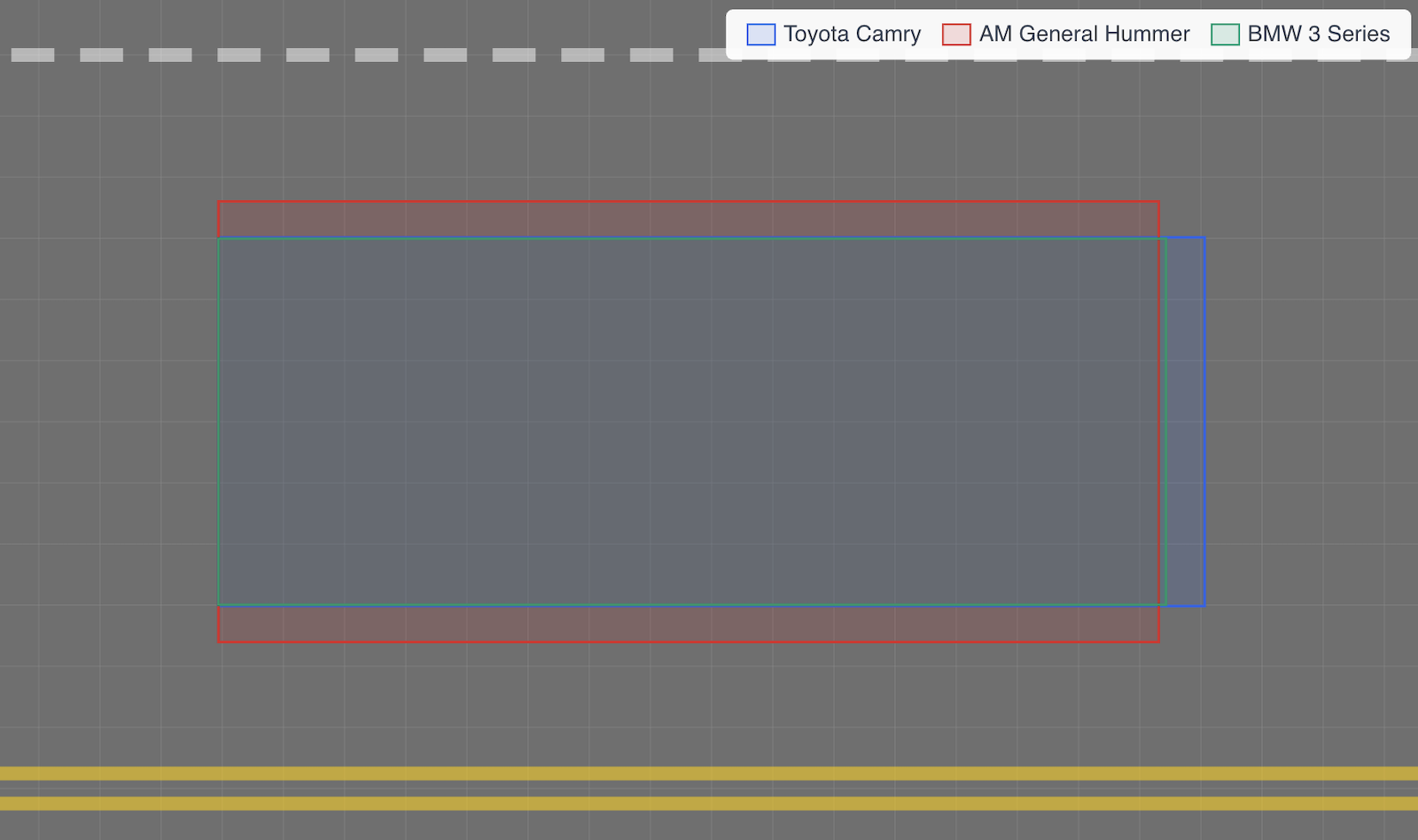
Actually, a more appropriate joke is saying a car has the turning radius of a Hummer, because the amount of space needed to pull a U-turn in one of those demilitarized troop carriers truly is appalling. Officially, the Hummer has a turning radius of 53 feet, and if we line that up against an F-150 King Ranch, the famously wide turning radius of an original Volvo XC90, and the turning radius of a current Camry, we can see that the Hummer is just on a different level.
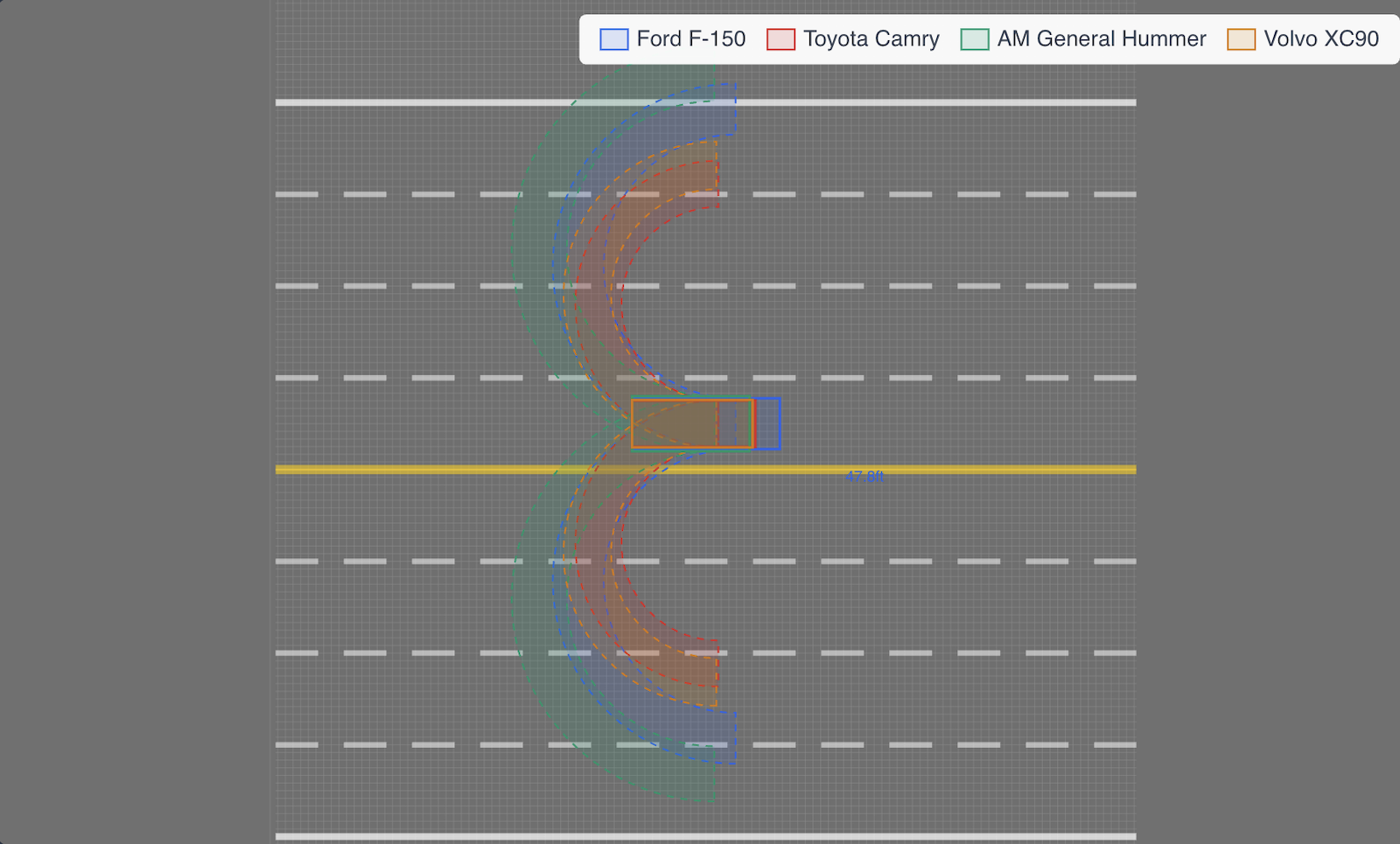
Conversely, the GMC Hummer EV 3X actually has a pretty good turning radius of 37.1 feet, thanks to the presence of four-wheel steering and the clearance to really swing those rear wheels. As a result, it needs less space to pull a U-turn than a new Toyota Camry, as the tool shows below. How’s that for modern technology at work?
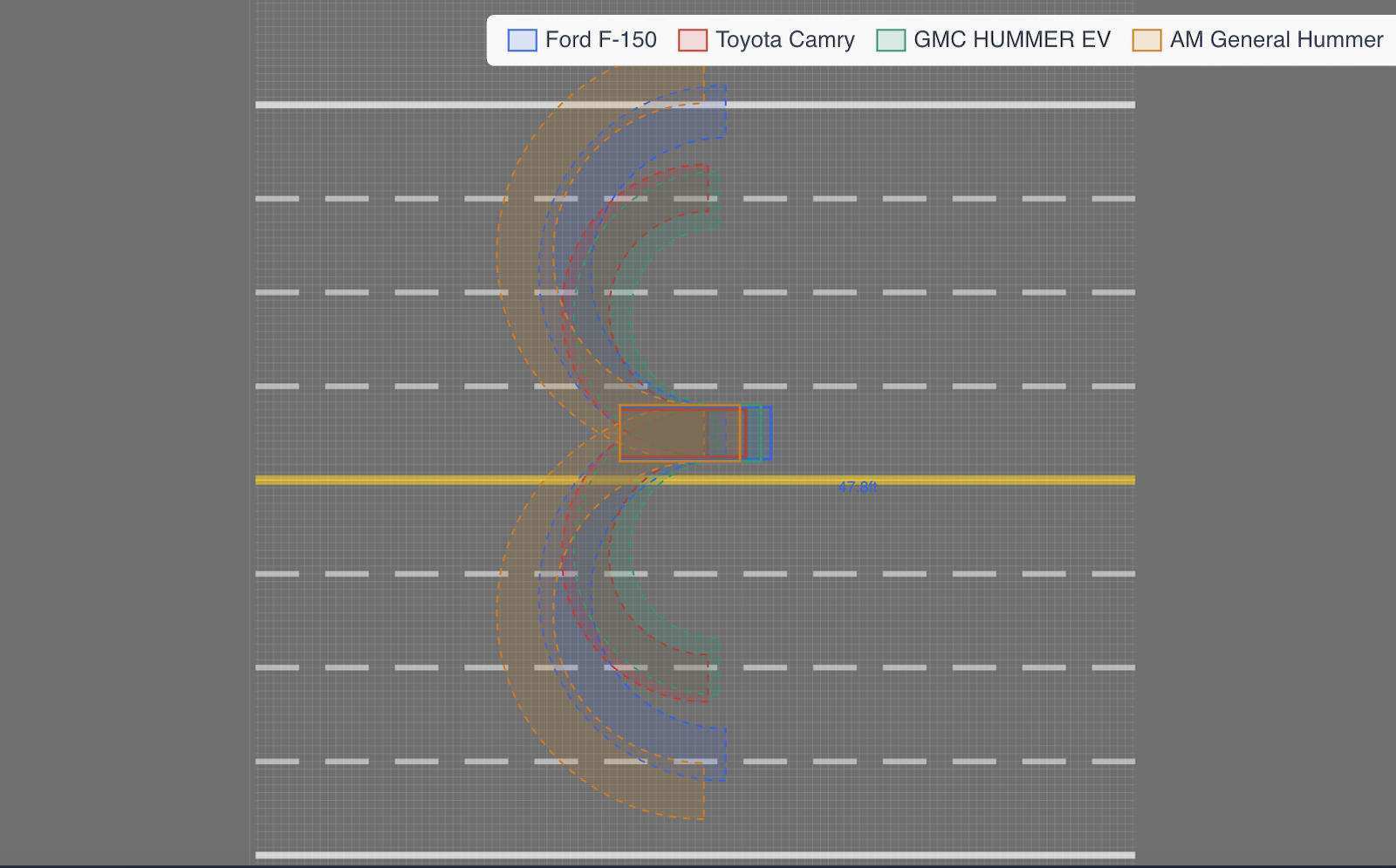
Of course, thanks to a length disparity of 32.3 inches, an AM General Hummer won’t stick out of a 216-inch by 102-inch parking space into the aisle, whereas the GMC Hummer EV will. Remember, even though the original Hummer has horrific space inefficiency and the width of a mobile home, it’s not all that long by modern standards.
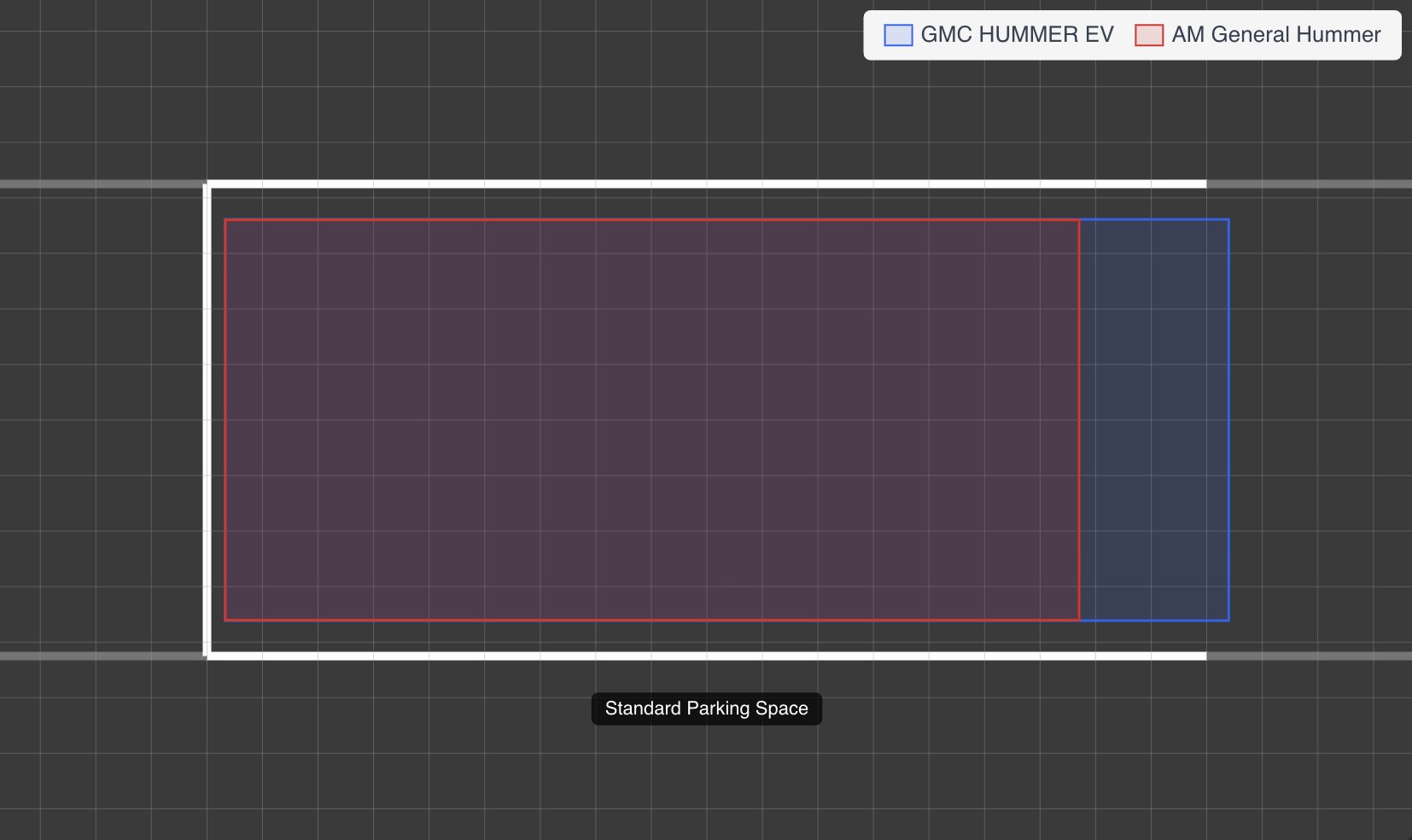
Before you go playing around with Car Chomper, be warned that not every graphical depiction in the tool will be accurate. Here, I’ve stacked up a 1992 Porsche 911 of the 964 generation, a 2000 Porsche 911 of the 996 generation, a 2015 Porsche 911 of the 991 generation, and a 2024 Porsche 911 of the 992 generation. Despite the red-outlined 996 standing six-tenths of an inch lower to the ground than the 964, graphics depict it as the tallest of the grouping. I reckon that’s because it’s the only one shown with ground clearance, so remember to double-check before you take a screenshot and hit send to your buddies.
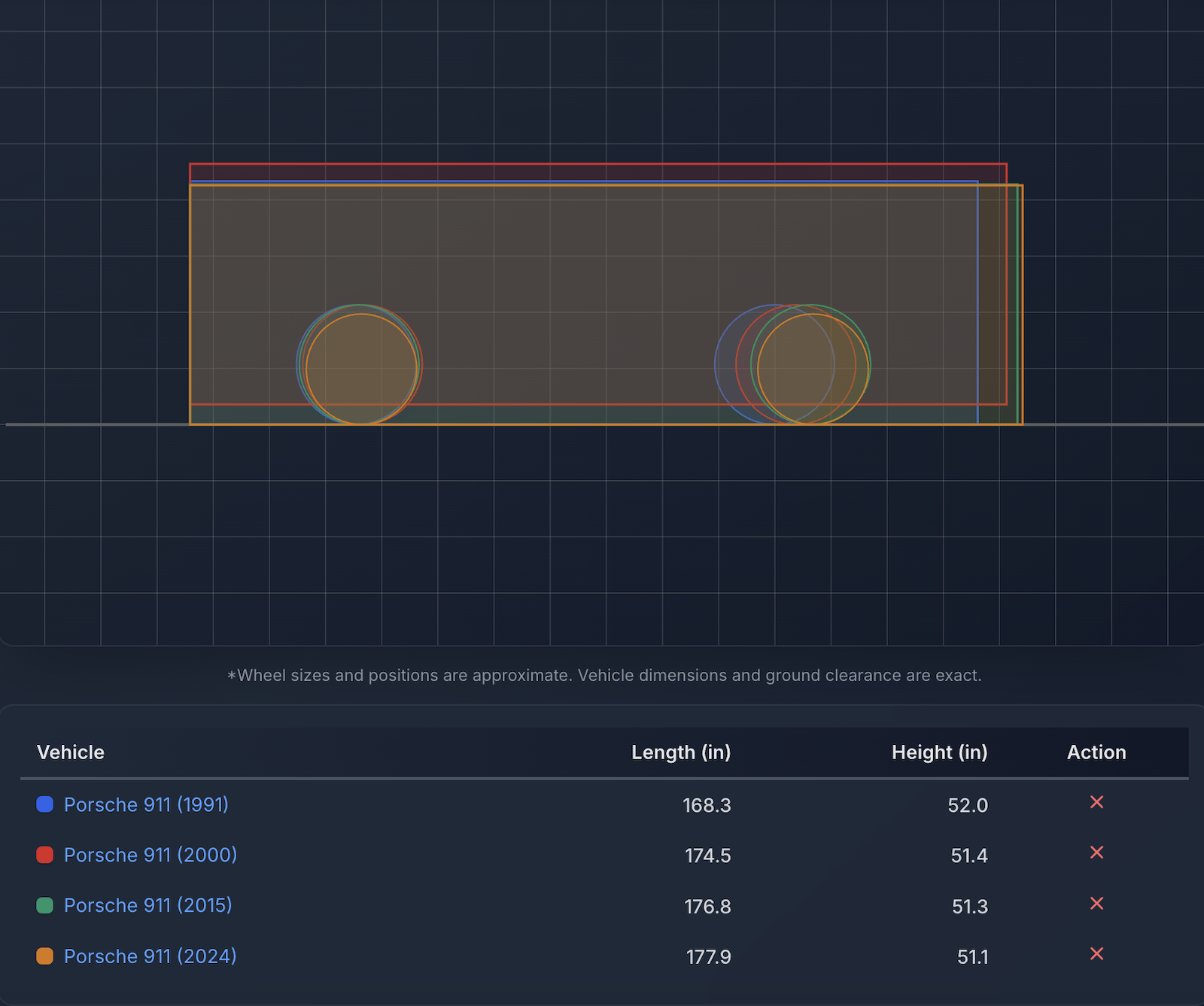
Still, the fact that a tool like this is out there is encouraging, because it has an air of the old internet. It’s hard not to get the sense that someone decided to build it because it was cool, not because it was a place to pack with ad and juice income. In any case … it’s Tuesday afternoon, your boss probably isn’t looking super closely, go nuts.
Top graphic images: GM; Fiat; Toyota; depositphotos.com
Support our mission of championing car culture by becoming an Official Autopian Member.

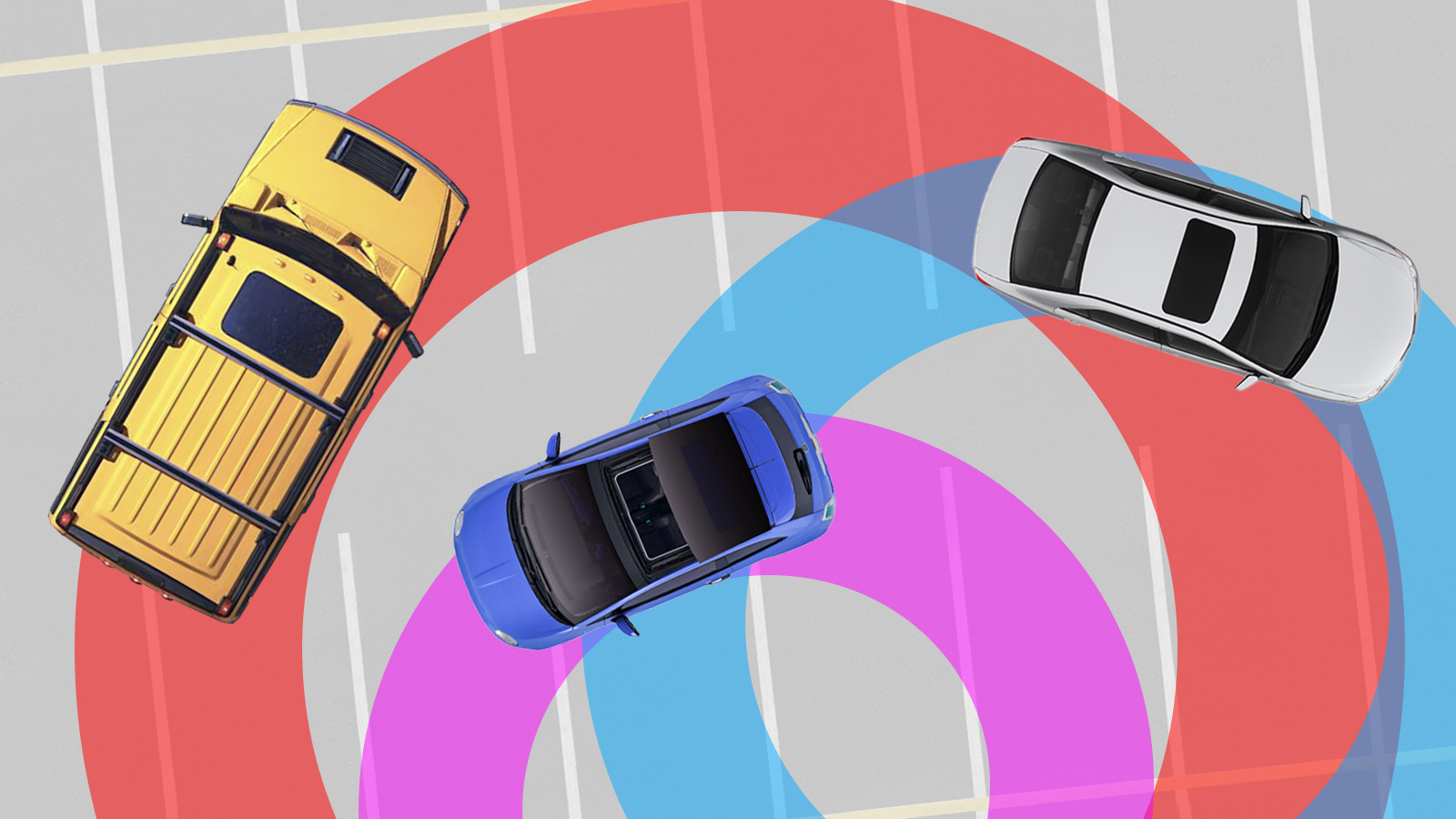






Perfect for those moments when your co-pilot says “Just pull a U-ey!”
The grey background of the graphics do them such a serious disservice as far making their point goes. Good grief! Go vivid, saturated on the colors and do it over white so we can see it!
And for WIW, both my ’01 Jetta and my ’17 Accord have a turning diameter of around 38′ or 11.6 meters. The Accord is longer, so I guess its wheels turn a little more. Unfortunately, it’s also wider which causes its own problems.
I used to land Cessnas on runways a lot narrower than that.
“Hummer: It’s Smaller Than You Think” seems like an appropriate marketing slogan.
Lol!
Wow. The aforementioned Hummer is pretty much the same length as my ’02 Mustang.
Once you add the stock F-150 to the comparisons, it definitely seems to bear out something I’ve thought for awhile – that in the last two decades, we were seeing a replay of the 70s, just in height instead of length, but now, we’ve added length back into the mix.
Two spring to mind, the FX4, hooray my one is almost done, (it has been almost done for ten years) amd yhe Triumph Herald. both have the same sort of turning circle as a hopped up Jack Russell but otherwise they are ordinary old things. The taxi has wierd reasons for this, and it is a taxi. The Herald? no reason at all, it is a very standard sort of car.
Heralds, and the Spitfire that is based on them, have a very tight turning circle simply because they have a VERY narrow chassis relative to their width, which allows tons of room for the wheels to turn.
I wonder if it has data on a standard Fiat 500 versus an Abarth? The regular 500 has the tight turning radius you would expect from a small city car, but the Abarth has different steering rack and a surprisingly large turning radius
You’re supposed to use weight transfer & occasional e-brake to reduce the Abarth turning radius. Had ~40k miles testing all methods.
Just chiming in because I’ve been meaning to mention that the ’89 Volvo 240 wagon I bought earlier in the summer has one of the most shockingly tight turning radiuses (radii?) of any car I’ve owned/driven lately, with the possible exception of my NA Miata.
According to DuckDuckGo’s AI, the 240 wagon’s turning radius is 9.8 meters, which is about 30 feet I guess. I honestly don’t know if the four and six cylinder versions of the car have different numbers (I’d assume the six has a larger turning radius) but in any case, I can turn so sharply and pull right into my driveway in the 240, instead of making a 3-5 point turn as has been necessary with other cars I’ve parked there in the past, including my Volvo XC90 which I never thought of as having a famously wide circle, but what do I know?
Anyway, if you ever get to pilot a 240, give it a try. It’s really quite shocking how tightly the car can turn.
Once, years ago, I was test-driving an ’86 740 GLE wagon. Driving down the Pacific Coast Highway, I took a look at the instrument cluster and asked the seller, “Does the gas gauge work?” He said, “I think so,” and I realized that we needed to turn around or we were going to run out of gas, so I pulled into the parking lot at Swami’s in Encinitas, which has an insanely tight turnaround at the end. Here I am in this big wagon, so I crank the wheel—and almost drive into the bushes because the turning radius was so much tighter than I was expecting. That thing just pivoted.
I didn’t buy it, and I never have owned a RWD Volvo, but I’ve promised my spouse that they one day have to drive one, because it must be experienced to be believed. Also the incredible outward visibility.
There is no difference between four and six cylinder 240s, but the turbos have a slightly worse turning circle because of the wider tires limiting steering lock a bit. But it’s only a foot or so difference.
Volvo singlehandedly went from the best turning radius ever on the FR I4 cars to the single worst in any regular car with the transverse I5 cars. It was a rude awakening the day my dad gave up his 740 for a V70.
My dad’s S60R was about on par with our farm truck, an F-350 king cab long bed. Truly abysmal.
Can confirm, I had a Volvo 245 (back before it was simplified to the 240) and despite it being a long-ass wagon it could u-turn in a lane and half.
Wheel cut angle makes a surprising difference. That’s why my 20′ long 2WD pickup has a tighter turning radius than our FWD Buick LeSabre. It also explains the Triumph Herald’s famously tight turning.
Saving this to glovebox for when I go to bed so I can fall asleep immediately.
For fun, I put in the 2025 Camry, the 2025 Accord, and my 2003 GMC Envoy SLT 4X4.
Guess which one has the better turning radius?
I can verify it checks out. That thing has a better turning radius than my 2wd GMC Canyon.
Well that’s one joke down.
Now fix its other jokes:
“pedestrian crusher”
“snowflake male ego booster”
“parking spaces hog”
“mall crawler”
“pavement princess”
Etc.
First no power steering kit for the Mondial, now I can’t even demonstrate why I want one.
The horrifying turning radii of the P2 platform cars was such a boof on Volvo’s part when the old RWD 200/700/900 cars had miraculously tight steering for their size. It wasn’t just a FWD/transverse thing, since the FWD 850 didn’t suffer too badly in this regard; it was trying to stuff a big inline six sideways between the turning wheels that doomed them.
It was almost as bad as it would be if Volvo stopped making their iconic wagons, or sacrificed their decades-old reputation as the safest of the safe on the altar of crappy all-touchscreen ergonomics or something…
I had a conversation last night with my wife that someone should make a way to compare turning radii of different cars and such. Now to see what she thinks about this
Is it really a conversation if she replied “Uh huh”? 😉
Cool – TIL that my A6 Allroad despite being slightly larger in every dimension has a 20″ smaller turning diameter than the A4 it replaced. Not one of the stats I compared when shopping I guess.
Give me 40 acres and I’ll turn this rig around…
Neat! I like that I can overlay wheelbases to figure out donors for chassis swaps.